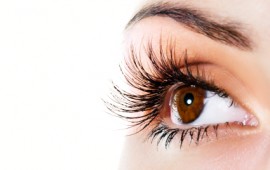Eye Care You Need to Know (Surprise Giveaway, Too!)
Author: Shannon Miller Lifestyle

Changes in a woman’s vision can be brought on by many factors.
Age is one of the causes of change in your eyesight, but there are other things that you may not be aware of, such as hormonal changes, environmental factors (like make-up) and inheriting certain eye diseases.
Here are a few recommendations to better eye health:
Care with Cosmetics
- Never use anyone else’s make-up. Two reasons why: Infections are transmitted this way, and you may be allergic to their brand of make-up.
- Avoid using old eye cosmetics. Eye make-up should be discarded every three to four months. Old make-up can become very contaminated. Seem like a lot? You don’t need to buy super expensive eye make-up. Splurge on stuff like powder or foundation. Plus, eye shadow trends vary season to season!
- Watch for allergic reactions. You can develop allergies to products that you have been using for years or you may become sensitive to certain ingredients in a product. Either can cause reactions in your eyes or on the sensitive skin around your eyes. If this happens, be careful when trying new eye care, skin care and makeup products.
Contact Wear
- If you wear contacts, choose a water-based, hypoallergenic liquid foundation, instead of cream, to prevent leaving a film on your lenses. You should avoid lash-extending mascara, which has fibers that can irritate the eyes, and waterproof mascara, which cannot be easily removed with water and may stain soft contact lenses.
- Avoid using hand creams or lotion before handling contacts; they can leave a film on your lenses. Use an oil-free moisturizer. Also, keep false eyelash glue, nail polish and remover, perfume and cologne, which can damage the plastic, away from lenses.
- Hairspray should be used before putting in contacts. If used while they are in, close your eyes during spraying. Put on soft contact lenses before applying makeup.
- Always wash your hands thoroughly before putting in your contacts.
It is not uncommon for women who are pregnant, taking an oral contraceptive, or going through menopause to experience changes in their vision. Be sure to educate yourself on your family history regarding any eye diseases.
Statistics indicate that women make the majority of the family’s health-care decisions, so it is a good idea to take steps to maintain your own and your family’s eye health through routine eye care and preventive measures.
TIP: Many vision changes can take place and you won’t even notice, which is why it is very important for you and your family to have regular, complete eye examinations. Plus, if you skip all the squinting, you’ll save your eyes from getting premature wrinkles!
Source: “Women’s Eye Health”, sightandhearing.org/
